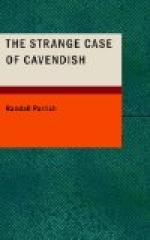Farriss’s letter contained nothing of interest except the fact that Enright had also left for the West. He instructed her to be on the lookout for him in Haskell, added a line or two of suggestions, and ordered her to proceed with caution, as her quest might prove to be a dangerous one.
Miss Donovan tore the letter into small bits, wrapping the fragments in a handkerchief until she could throw them safely away. For some time she stood motionless at the window, looking out, but seeing nothing, her mind busy with the problem. She thought rapidly and clearly, more than ordinarily eager to solve this mystery. She was a newspaperwoman, and the strange story in which she was involved appealed to her imagination, yet its appeal was far more effective in a purely personal way. It was Frederick Cavendish who had formerly been the partner of Jim Westcott. This was why no answer had come to the telegrams and letters the latter had sent East. What had become of them? Had they fallen into the hands of these others? Was this the true reason for Beaton’s presence in Haskell, and also why the La Rue woman had been hastily sent for? She was not quite ready to accept that theory; the occasion hardly seemed important enough by itself alone.
Westcott’s discovery was not even proven yet; its value had not been definitely established; it was of comparatively small importance contrasted with the known wealth left by the murdered man in the East. No, there must be some other cause for this sudden visit to Colorado. But what? She gave little credence to the vague suspicions advanced by Valois; that was altogether too impossible, too melodramatic, this thought of the substitution of some other body. It might be done, of course; indeed, she had a dim remembrance of having read of such a case somewhere, but there could be no object attained in this affair. Frederick dead, apparently killed by a burglar in his own apartments, was quite understandable: but kidnapped and still alive, another body substituted for his, resembling him sufficiently to be unrecognised as a fraud, would be a perfectly senseless procedure. No doubt there had been a crime committed, its object the attainment of money, but without question the cost had been the life of Frederick Cavendish.
Yet why was the man Beaton out here? For what purpose had he wired the La Rue woman to join him? And why had some one already entered her room and examined the contents of Stella Donovan’s bag? To these queries there seemed to be no satisfactory answers. She must consult with Westcott, and await an opportunity to make the acquaintance of Celeste La Rue.
She was still there, her elbows on the window-ledge, her face half concealed in the hollow of her hands, so lost in thought as to be oblivious to the flight of time, when the harsh clang of the dinner-bell from the porch below aroused her to a sense of hunger.
Ten minutes later Timmons, guiltless of any coat, but temporarily laying aside his pipe as a special act of courtesy, escorted her into the dining-room and seated her at a table between the two front windows. Evidently this was reserved for the more distinguished guests—travelling men and those paying regular day rates—for its only other occupant was the individual in the check suit whom she vaguely remembered passing on the street a few hours before.




